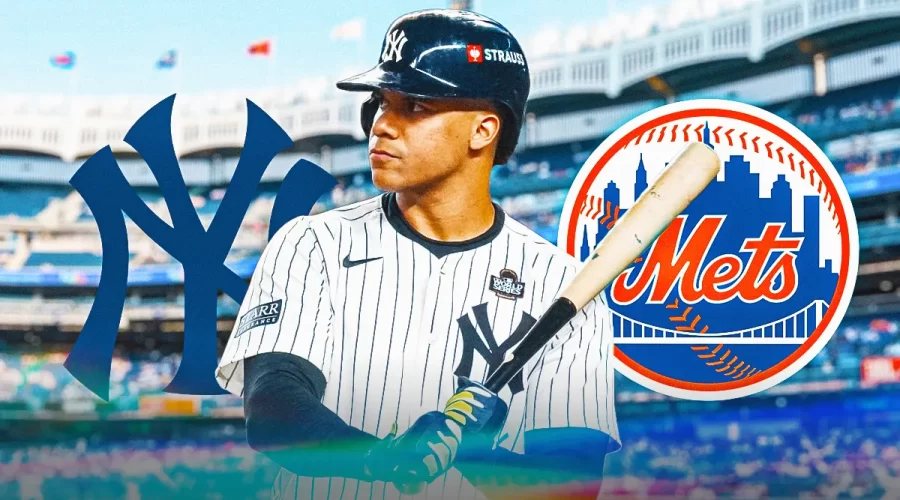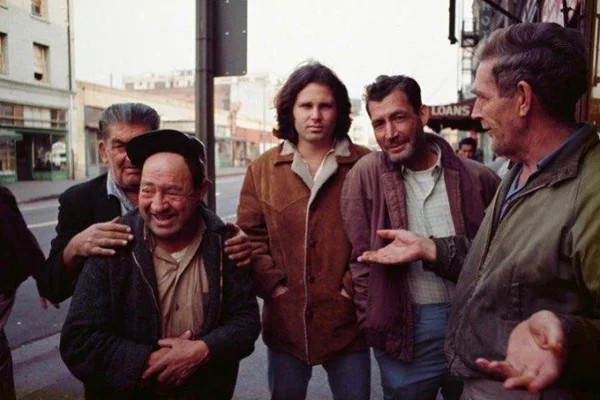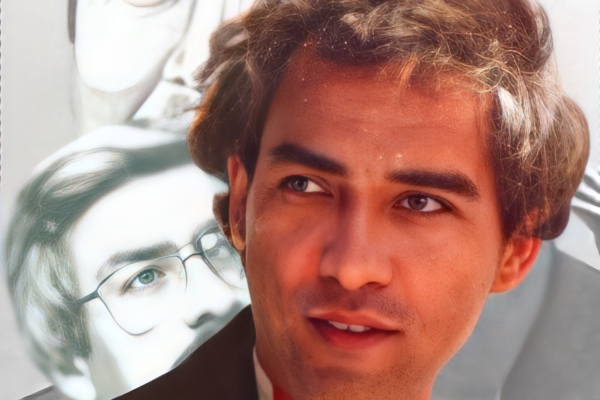This isn’t just a win for the Mets — it’s a psychological blow to the Yankees. For a franchise that has long prided itself on being the preeminent power in baseball, losing Juan Soto to the team across town is a humbling moment.
I am a lifelong New York Yankee fan, but I fear that I will never see the Yankees win a World Series in what’s left of my lifetime. I was assured of that the moment the Yankees lost slugger Juan Soto to the New York Mets.
Call it the Curse of the Childish Bambino.
The Boston Red Sox were haunted by the Curse of the Bambino after dealing away Babe Ruth to the Yankees in 1920. So, too, now will the Yankees be plagued by the Curse of the Childish Bambino after allowing the Mets to steal him in free agency on a record contract that they could have easily exceeded if they had wanted to.

Fifteen years. $765 million. No deferred money. The Yankees had reportedly offered $700 million. Soto had made no secret that he just wanted a contract that would have surpassed that of Shohei Ohtani’s $700 million deal with the Dodgers.
He wanted to be known, if only until the next record contract signee makes a deal, as today’s greatest baseball player in the world—the money saying so.
But Yankees chickened out at the negotiating table. Blame that on General Manager Brian Cashman and the ownership of Yankee Global Enterprises under the control of the family of George Steinbrenner, with his son Hal Steinbrenner serving as Chairman and Managing General Partner of the team.
Maybe they believe the Yankees as they currently exist are a world series championship team. They are clearly not. Soto almost won them a championship in 2024 and would have, if Aaron Judge had had even a subpar World Series. But the fact of the matter is that Aaron Judge had the worst World Series any superstar could ever imagine enduring.
Only in Los Angeles, which won the World Series in five games, is the disastrous championship series of Aaron Judge recognized for what it was: thankfully, for the Dodgers’ sake, Aaron Judge’s horrendous 2024 World Series was that of the player who handed the Los Angeles Dodgers the title on a silver platter.
And now the Yankees have left the door open for more, assuming the Mets and Juan Soto don’t get in their way in the Dodgers defending their National League championship this year and in years to come.
As for the Yankees, The Curse of the Childish Bambino wIll see to their continued frustration. Childish Bambino, yes. It is Soto’s sobriquet coined by Baseball Prospectus editor Craig Goldstein as a play on the Great Bambino—obviously—and hip hop artist Childish Gambino.
And again the money that stopped the Yankees from keeping Soto as their own: Fifteen years. $765 million. No deferred money.
These staggering numbers aren’t just figures; they are a seismic shift in the landscape of professional sports, making Juan Soto’s record-breaking contract with the Mets more than a mere transaction. It’s a declaration. A baseball prodigy from the Dominican Republic who stormed into the majors at 19, bet on himself by turning down $440 million two years ago, and has now cemented himself as not just the richest player in the game but also the face of an ambitious new Mets era.
The reverberations of this deal extend beyond Soto’s personal triumph. It represents the Mets stepping out of the long shadow cast by their illustrious neighbors in the Bronx. For the first time in memory, the Mets didn’t just outbid their crosstown rivals—they beat them outright. And for a Yankees player to choose the Mets? That’s a story that feels more like fiction than fact.
To appreciate the significance of this moment, consider where the Mets were just a few years ago. For most of their existence, they’ve been defined by a peculiar mix of occasional brilliance and persistent calamity. The Mets, it was said, were always the Metsiest Mets—a team that seemed cursed to fail in the most spectacular ways.
Enter Steve Cohen. When the billionaire hedge fund titan purchased the team in 2020, Mets fans dared to dream. The richest owner in baseball, with an estimated $20 billion net worth, Cohen promised to turn the franchise into a juggernaut. He wasted no time, bringing in Francisco Lindor, overhauling the organization, and—perhaps most importantly—changing the culture of a team that had long acted like a mid-market club.
Soto’s signing is the culmination of Cohen’s vision. This is more than a flashy move; it’s a statement that the Mets are no longer content with being the underdog. They are here to dominate.
Juan Soto’s $765 million contract isn’t just the largest in baseball—it’s the largest in the history of sports. Bigger than Shohei Ohtani’s $700 million deal with the Dodgers. Bigger than Lionel Messi’s contracts in soccer or Patrick Mahomes’ in football.
The sheer size of the deal boggles the mind, but it’s not surprising. Soto is a generational talent. At 26, he brings a combination of power, plate discipline, and clutch performance that’s unmatched in today’s game. This October, he proved his worth by delivering for the Yankees on the biggest stage, helping them to a World Series berth. Now, he’ll anchor a Mets lineup alongside Lindor and rising star Mark Vientos, forming a core that could rival any in baseball.
Yet with great contracts come great expectations. For $765 million, Soto isn’t just being paid to play baseball; he’s being paid to transform a franchise.
Perhaps the most delicious subplot of this deal is the Mets beating the Yankees at their own game.
The Yankees wanted Soto. Badly. He was the heart of their lineup in 2024, a cornerstone of their offense and a fan favorite. They were willing to pay—offering a reported $700 million over 15 years.
Why didn’t they just offer another $75 million to. $100 million? If the Yankee brass and their fans need a hint of why, the answer perhaps comes more easily in Juan Soto’s native language: cojones.
Juan Soto has them. And so do some billionaires, obviously, though ,not the ones who own the Yankees.
But Steve Cohen doesn’t play to compete; he plays to win. The Mets not only outbid the Yankees but also offered something intangible: a vision of the future. Cohen’s willingness to spend, combined with the front-office acumen of president David Stearns and the leadership of new manager Carlos Mendoza, made Queens a destination.
This isn’t just a win for the Mets; it’s a psychological blow to the Yankees. For a franchise that has long prided itself on being the preeminent power in baseball, losing Soto to the team across town is a humbling moment.
Of course, the Mets’ ambitions go beyond beating the Yankees. The National League remains a gauntlet, with the Los Angeles Dodgers and Atlanta Braves standing as perennial powerhouses.
The Dodgers, fresh off a World Series win, continue to set the standard for organizational depth and consistency. Meanwhile, the Braves’ core of young stars makes them a perennial threat in the NL East.
For the Mets to achieve their championship aspirations, they’ll need more than Soto. Their rotation, headlined by Kodai Senga and bolstered by offseason additions like Clay Holmes and Frankie Montas, still lacks the depth of the Dodgers. Their farm system, depleted by years of trades and lower draft picks, must be rebuilt to sustain long-term success.
But Cohen has made it clear: this isn’t about one year. The Mets are building a dynasty, and Soto is the foundation.
Baseball is a game of unpredictability. Even the best-laid plans can be undone by injuries, slumps, or the fickle nature of October baseball. Soto’s deal is no guarantee of a championship.
Yet for a franchise like the Mets, the risk is worth it. Baseball history is littered with examples of teams that spent big and failed. But it’s also filled with stories of those who dared to dream big—and succeeded.
Soto’s ability to live up to this contract will define his legacy. He must not only continue to perform at an elite level but also embrace the pressure of being the highest-paid athlete in sports. The fans in Queens will adore him if he succeeds. If he doesn’t? Well, New York is not known for its patience.
So, Soto’s signing feels like the beginning of a new chapter—not just for the Mets, but for baseball as a whole. It’s a reminder of what the game can be when talent and ambition collide.
For Mets fans, this is a moment of vindication. After years of heartbreak, they finally have an owner willing to do whatever it takes to win. For baseball, it’s a sign that the sport still has the power to shock and awe.
And for Juan Soto, it’s the ultimate validation of a career that has already been extraordinary. Now comes the hard part: delivering on the promise.
The 7 train is leaving the station, bound for what Cohen hopes is a golden era in Mets history. All aboard.
TONY CASTRO, the former award-winning Los Angeles columnist and author, is a writer-at-large and the national political writer for LAMonthly.org. His forthcoming novel, THE BOOK OF MARILYN, will be published in 2025. He can be reached at tony@tonycastro.com.





